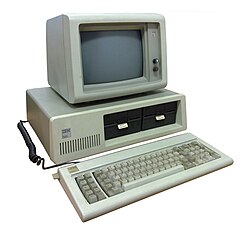IBM PC

|
|
| Type | Personal computer |
|---|---|
| Release date | August 12, 1981 |
| Discontinued | April 2, 1987 |
| Operating system | IBM BASIC / PC DOS 1.0 CP/M-86 UCSD p-System |
| CPU | Intel 8088 @ 4.77 MHz |
| Memory | 16 kB ~ 256 kB |
| Sound | 1-channel PWM |
| Predecessor | IBM Datamaster |
| Successor |
IBM Personal Computer XT IBM PCjr IBM Portable Personal Computer IBM Personal Computer/AT IBM PC Convertible |

IBM 5150 PC with IBM 5151 monitor
|
The IBM Personal Computer, commonly known as the IBM PC, is the original version and progenitor of the IBM PC compatible hardware platform. It is IBM model number 5150, and was introduced on August 12, 1981. It was created by a team of engineers and designers under the direction of Don Estridge of the IBM Entry Systems Division in Boca Raton, Florida.
The generic term "personal computer" was in use before 1981, applied as early as 1972 to the Xerox PARC's Alto, but because of the success of the IBM Personal Computer, the term "PC" came to mean more specifically a desktop microcomputer compatible with IBM's PC products. Within a short time of the introduction, third-party suppliers of peripheral devices, expansion cards, and software proliferated; the influence of the IBM PC on the personal computer market was substantial in standardizing a platform for personal computers. "IBM compatible" became an important criterion for sales growth; only the Apple Macintosh family kept significant market share without compatibility with the IBM personal computer.
International Business Machines (IBM), one of the world's largest companies, had a 62% share of the mainframe computer market in 1981. Its share of the overall computer market, however, had declined from 60% in 1970 to 32% in 1980. Perhaps distracted by a long-running antitrust lawsuit, the "Colossus of Armonk" completely missed the fast-growing minicomputer market during the 1970s, and was behind rivals such as Wang, Hewlett-Packard (HP), and Control Data in other areas.
...
Wikipedia
